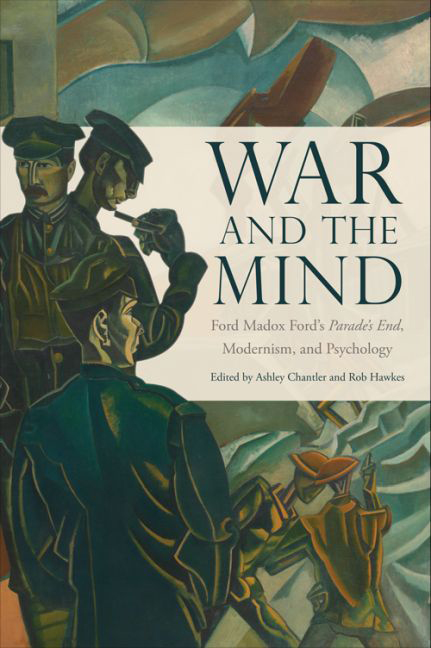Book contents
- Frontmatter
- Contents
- Acknowledgements
- Introduction
- 1 ‘Sex ferocity’ and ‘the sadic lusts of certain novelists’: Sexuality, Sadomasochism, and Suppression in Parade's End
- 2 Freud Madox Ford: Impressionism, Psychoanalytic Trauma Theory, and Ford's Wartime Writing
- 3 Empathy, Trauma, and the Space of War in Parade's End
- 4 Fellow Feeling in Ford's Last Post: Modernist Empathy and the Eighteenth-Century Man
- 5 The Self-Analysis of Christopher Tietjens
- 6 Composing the War and the Mind; Composing Parade's End
- 7 The Work of Sleep: Insomnia and Discipline in Ford and Sassoon
- 8 Representing Shell Shock: A Return to Ford and Rebecca West
- 9 ‘I hate soldiering’: Ford, May Sinclair, and War Heroism
- 10 Peace of Mind in Parade's End
- Notes on Contributors
- Bibliography
- Index
Introduction
Published online by Cambridge University Press: 15 September 2017
- Frontmatter
- Contents
- Acknowledgements
- Introduction
- 1 ‘Sex ferocity’ and ‘the sadic lusts of certain novelists’: Sexuality, Sadomasochism, and Suppression in Parade's End
- 2 Freud Madox Ford: Impressionism, Psychoanalytic Trauma Theory, and Ford's Wartime Writing
- 3 Empathy, Trauma, and the Space of War in Parade's End
- 4 Fellow Feeling in Ford's Last Post: Modernist Empathy and the Eighteenth-Century Man
- 5 The Self-Analysis of Christopher Tietjens
- 6 Composing the War and the Mind; Composing Parade's End
- 7 The Work of Sleep: Insomnia and Discipline in Ford and Sassoon
- 8 Representing Shell Shock: A Return to Ford and Rebecca West
- 9 ‘I hate soldiering’: Ford, May Sinclair, and War Heroism
- 10 Peace of Mind in Parade's End
- Notes on Contributors
- Bibliography
- Index
Summary
Dust and corpses in the thistles
Where the gas-shells
burst like snow,
And the shrapnel screams and whistles
On the Becourt road below,
And the High Wood bursts and bristles
Where the mine-clouds
foul the sky …
But I'm with you up at Wyndcroft,
Over Tintern on the Wye.
Ford and the War
Having enlisted in the summer of 1915, Ford Madox Ford, aged forty-two, was sent to France on 13 July 1916 as a second lieutenant with the Welch Regiment (Special Reserve). Attached to the 9th Battalion of the Regiment at Rouen, he was then sent to the Somme, just behind the Front Line. Towards the end of July, things were okay with Ford, all things considering:
We are right up in the middle of the strafe, but only with the Ist line transport. We get shelled two or three times a day, otherwise it is fairly dull – indeed, being shelled is fairly dull, after the first once or twice. Otherwise it is all very interesting – filling in patches of one's knowledge & so on […]. The noise of the bombardment is continuous – so continuous that one gets used to it, as one gets used to the noise in a train and the ear picks out the singing of innumerable larks….
That day or the next, Ford was ‘blown into the air by something’ and fell ‘on [his] face’, causing concussion, damage to his mouth and teeth, and subsequent memory loss. ‘It had been from some date in August till about the 17th September that I had completely lost my memory, so that […] three weeks of my life are completely dead to me.’ Sent to a casualty clearing station in Corbie, Ford's shell shock went undiagnosed: ‘nothing more romantic […] happened than having my teeth fixed’.
- Type
- Chapter
- Information
- War and the MindFord Madox Ford's Parade's End, Modernism, and Psychology, pp. 1 - 16Publisher: Edinburgh University PressPrint publication year: 2015

